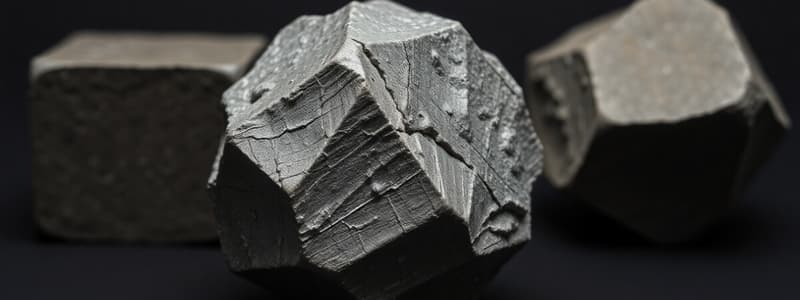Podcast
Questions and Answers
What type of quantity is speed?
What type of quantity is speed?
- Both scalar and vector
- Scalar quantity (correct)
- Neither scalar nor vector
- Vector quantity
Displacement is defined as the total length of the path travelled by an object.
Displacement is defined as the total length of the path travelled by an object.
False (B)
What is the formula to calculate average speed?
What is the formula to calculate average speed?
Average Speed = Total distance travelled / Total time taken
Acceleration is the rate of change of ______.
Acceleration is the rate of change of ______.
Which of the following is an example of a vector quantity?
Which of the following is an example of a vector quantity?
Match the following terms with their correct definitions:
Match the following terms with their correct definitions:
Calculate the average speed of a car that travels 60 km in 1.5 hours.
Calculate the average speed of a car that travels 60 km in 1.5 hours.
Two quantities can be considered equal if they possess different numerical values but the same units.
Two quantities can be considered equal if they possess different numerical values but the same units.
Speed is a vector quantity.
Speed is a vector quantity.
Which of the following is a scalar quantity?
Which of the following is a scalar quantity?
What is the formula for calculating acceleration?
What is the formula for calculating acceleration?
The average speed of a car that travels 300 km in 5 hours is ___ km/h.
The average speed of a car that travels 300 km in 5 hours is ___ km/h.
Match the following quantities with their definitions:
Match the following quantities with their definitions:
What is the resultant acceleration if the initial velocity is 20 m/s, final velocity is 50 m/s, and time taken is 5 sec?
What is the resultant acceleration if the initial velocity is 20 m/s, final velocity is 50 m/s, and time taken is 5 sec?
Displacement can be equal to distance but generally is not.
Displacement can be equal to distance but generally is not.
Describe what is meant by a vector quantity.
Describe what is meant by a vector quantity.
Which of the following describes a scalar quantity?
Which of the following describes a scalar quantity?
What is the formula for calculating density?
What is the formula for calculating density?
The area of a circle is calculated using the formula ____.
The area of a circle is calculated using the formula ____.
Match the type of quantities with their definitions:
Match the type of quantities with their definitions:
What happens to an object if its density is greater than that of water?
What happens to an object if its density is greater than that of water?
The area of a triangle is calculated using the formula (base x height) / 2.
The area of a triangle is calculated using the formula (base x height) / 2.
Calculate the area of a triangle with a base of 5 cm and a height of 4 cm.
Calculate the area of a triangle with a base of 5 cm and a height of 4 cm.
Flashcards
Scalar Quantity
Scalar Quantity
A physical quantity described by only its magnitude (size) and no direction.
Vector Quantity
Vector Quantity
A physical quantity described by both its magnitude and direction.
Density
Density
Mass per unit volume of a substance.
Physical Quantity
Physical Quantity
Signup and view all the flashcards
Mass
Mass
Signup and view all the flashcards
Weight
Weight
Signup and view all the flashcards
Displacement
Displacement
Signup and view all the flashcards
Area of a Rectangle
Area of a Rectangle
Signup and view all the flashcards
Speed
Speed
Signup and view all the flashcards
Velocity
Velocity
Signup and view all the flashcards
Average Speed
Average Speed
Signup and view all the flashcards
Acceleration
Acceleration
Signup and view all the flashcards
Calculating Acceleration
Calculating Acceleration
Signup and view all the flashcards
Average Velocity
Average Velocity
Signup and view all the flashcards
Distance
Distance
Signup and view all the flashcards
Study Notes
Physics
- Physics is the branch of science that deals with the interrelationship between matter and its ability to do work.
Quantities
- Physical Quantities: Can be measured and have units (e.g., length, mass, time).
- Non-Physical Quantities: Cannot be measured and do not have units (e.g., feelings, emotions).
Physical Quantities
- Basic Quantities: Not made from a combination of other quantities (e.g., mass, length, time).
- Derived Quantities: Made from a combination of basic quantities (e.g., area, volume, speed).
Mass
- Mass is the amount of inertia in an object.
- Mass remains constant.
- Mass is a scalar quantity.
Weight
- Weight is the gravitational pull that the Earth is applying on an object.
- Weight is not constant.
- Weight is a vector quantity.
Area and Volume
- Area of a square = side × side
- Area of a rectangle = length × width
- Area of a circle = πr²
- Circumference of a circle = 2πr
- Area of a triangle = ½ × base × height
Volume of a Cuboid/Cylinder
- Volume of a cuboid = length × width × height
- Volume of a cylinder = πr²h
Density
- Density = mass/volume
- Symbol for density is ρ(rho)
- Unit of density is kg/m³ or g/cm³.
- If an object's density is less than water's, it will float.
- If an object's density is more than water's, it will sink.
Scalars and Vectors
- Scalars: Physical quantities described only by magnitude (e.g., speed, distance, mass, time).
- Vectors: Physical quantities described by both magnitude and direction (e.g., velocity, displacement, force, momentum).
Kinematics
- Kinematics is the study of motion, including speed, velocity, and acceleration.
- Speed: The distance travelled per unit time (scalar).
- Velocity: The displacement per unit time (vector).
- Acceleration: The rate of change of velocity (vector).
Average Speed
- Average speed = total distance travelled / total time taken.
- Average speed is used to show the speed of an object over a period of time, like a journey.
Acceleration
- Acceleration = (final velocity – initial velocity) / time taken.
Studying That Suits You
Use AI to generate personalized quizzes and flashcards to suit your learning preferences.




